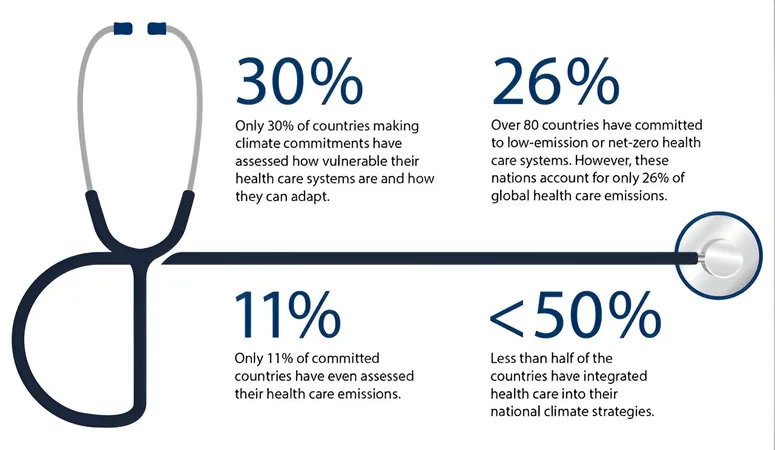
Alarming Shortcomings Uncovered in Global Health Care Sustainability Commitments
2024-10-09
Author: Jia
A recent study led by Yale University experts has revealed that numerous nations are failing to meet their international pledges to enhance the sustainability of their health care systems. This alarming report highlights critical gaps in assessing and monitoring greenhouse gas emissions and indicates a lack of comprehensive strategies aimed at making health care operations more resilient and environmentally friendly.
The study underscores that the health care sector contributes nearly 5% of global greenhouse gas emissions, leading to an alarming loss of 4 million Disability Adjusted Life Years annually— a metric that quantifies years lost due to health issues, disability, or premature death. "As climate and pollution-related illnesses rise, it becomes increasingly essential for health systems to adapt and build resilience against extreme weather events," stated Jodi Sherman, an associate professor at Yale School of Medicine and one of the study’s co-authors.
Published in *The Lancet Planetary Health*, the research analyzed the commitments made by over 80 countries during the COP26 Health Program, which emerged from the 2021 United Nations Climate Change Conference in Glasgow. These nations had agreed to a tiered approach aimed at developing climate-resilient, low-carbon health systems. Shockingly, only 30% of the countries that made these commitments have conducted necessary vulnerability and adaptation assessments for their health care systems.
While 85 countries pledged to transition towards low-emission or net-zero health care systems, these nations are responsible for just 26% of global health care emissions. Disturbingly, merely 11% of these countries have even evaluated their health care emissions. Additionally, less than half have incorporated health care considerations into their national climate strategies, which raises concerns about the seriousness of their commitments.
The study also unearths significant flaws in the current methods used to monitor sustainable health care progress. The authors express concern that existing indicators, as proposed by the World Health Organization, are inadequate, potentially leading to "greenwashing"—the misleading portrayal of sustainability efforts. “Without reliable and independent monitoring, the illusion of progress could overshadow the urgent need for real change in the health care sector,” cautioned Iris Martine Blom, the study's lead author and a physician based at the London School of Hygiene & Tropical Medicine.
As the health care sector faces increasing demands due to climate change and pollution-related health issues, the time for action is now. Countries must not only meet their commitments but also ensure meaningful tracking and reporting mechanisms are in place to facilitate genuine progress in building sustainable health care systems. The implications of this research are clear: the global health care community must revitalize its efforts or risk further degradation in both health outcomes and environmental impact.



 Brasil (PT)
Brasil (PT)
 Canada (EN)
Canada (EN)
 Chile (ES)
Chile (ES)
 España (ES)
España (ES)
 France (FR)
France (FR)
 Hong Kong (EN)
Hong Kong (EN)
 Italia (IT)
Italia (IT)
 日本 (JA)
日本 (JA)
 Magyarország (HU)
Magyarország (HU)
 Norge (NO)
Norge (NO)
 Polska (PL)
Polska (PL)
 Schweiz (DE)
Schweiz (DE)
 Singapore (EN)
Singapore (EN)
 Sverige (SV)
Sverige (SV)
 Suomi (FI)
Suomi (FI)
 Türkiye (TR)
Türkiye (TR)